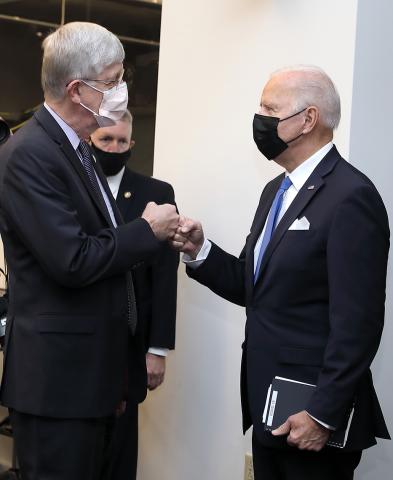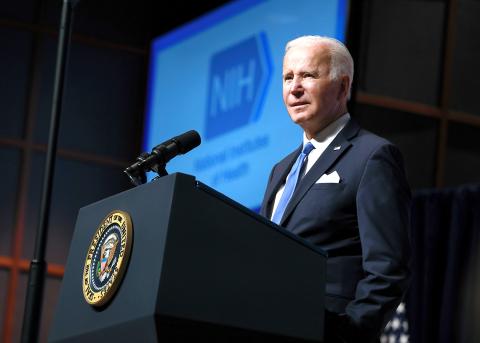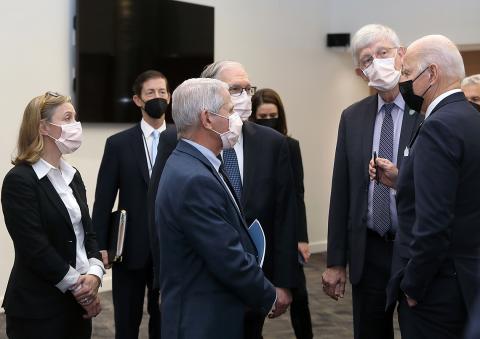‘With Science and Speed’
At NIH, President Announces Winter Strategy vs. Pandemic

Photo: Chia-Chi Charlie Chang
With winter approaching and a new Covid-19 variant—omicron—identified just days previously in the U.S., President Joe Biden made his second visit this year to NIH on Dec. 2 to discuss the nation’s new strategy against the pandemic.
“The actions I’m announcing are ones that all Americans can rally behind and should unite us in the fight against Covid-19,” Biden said. “[The measures] come from a position of strength. We are better positioned than we were a year ago…[We have to] put the divisiveness behind us and unite with a common purpose—think of it as a patriotic responsibility. [This plan] doesn’t include shutdowns or lockdowns, but widespread vaccinations and boosters, testing and a lot more…
“This new variant is cause for concern, not panic,” Biden emphasized. “We have the best tools, the best vaccines, the best medicines and the best scientists in the world. We’re going to fight [omicron] with science and speed, not chaos and confusion.”

Photo: Chia-Chi Charlie Chang
The president’s strategy—developed with combined advice from some of the nation’s top physicians, scientists and public health experts—employs five key actions:
- Expand the nationwide booster campaign with more outreach, appointments, hours and sites to walk in for shots for up to 110 million Americans who are eligible for boosters
- Launch new family vaccination clinics “to make it easier for children, parents and whole families to get vaccinated in one place, and new policies to keep our children in school instead of quarantining at home”
- Make free, at-home Covid-19 tests more widely accessible and covered by private health insurance
- Increase to 60 the number of surge response teams (physicians, nurses and other health care workers trained in providing emergency medical care) that are deployed to communities with rising caseloads and overwhelmed hospitals
- Speed up efforts to vaccinate the rest of the world
“We will accelerate the delivery of more vaccines to countries that need it,” Biden said. “[The U.S. pledges] 200 million more doses in the next 100 days, on our way to delivering more than 1.2 million doses for the rest of the world. Let me be clear. Not a single vaccine dose that America sends to the rest of the world will ever come at the expense of any American. I’ll always make sure that our people are protected first.”

Photo: Chia-Chi Charlie Chang
Before the President took the stage in Natcher’s Ruth Kirschstein Auditorium, agency leaders—including NIH director Dr. Francis Collins, principal deputy director Dr. Lawrence Tabak, NIAID director Dr. Anthony Fauci and Vaccine Research Center deputy director and chief medical officer Dr. Julie Ledgerwood—briefed him on how viral mutations occur and why vaccines and boosters are important as the virus that causes Covid-19 continues to mutate into new variants, like omicron.
Biden also took a moment to thank Collins, “one of the most important scientists of our times…He’s done an incredible job. He recently announced he’s going to step down as director of NIH this month after a truly consequential tenure.
“He’s an incredible resource for our nation,” Biden continued. “I mean this sincerely—I’m grateful for everything he’s done for this pandemic and in advancing all kinds of medical breakthroughs, including mapping the human genome…The good news for us is that he’s returning to the lab at [the National Human Genome Research Institute] and we look forward to his unmatched ability to unlock possibilities that are within our reach.
“The bad news for you, Doc, is, you ain’t getting rid of me, man!” the President joked to Collins who sat in the front row during the remarks. “I’m going to keep calling you all the time, because there’s a lot of other things you can help me get done.”
The President ended his visit with thanks on behalf of the country.
“God bless our doctors, our scientists and all of you here at NIH, for what you’re doing for the country and quite frankly, for the world,” Biden concluded. “You’re the best, the very, very best.”
